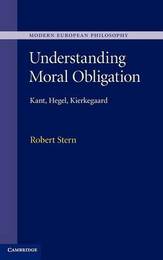
|
Understanding Moral Obligation: Kant, Hegel, Kierkegaard
Hardback
Main Details
| Title |
Understanding Moral Obligation: Kant, Hegel, Kierkegaard
|
| Authors and Contributors |
By (author) Robert Stern
|
| Series | Modern European Philosophy |
|---|
| Physical Properties |
| Format:Hardback | | Pages:292 | | Dimensions(mm): Height 229,Width 152 |
|
| Category/Genre | History of Western philosophy
Ethics and moral philosophy |
|---|
| ISBN/Barcode |
9781107012073
|
| Classifications | Dewey:170 |
|---|
| Audience | | Professional & Vocational | |
|---|
|
Publishing Details |
| Publisher |
Cambridge University Press
|
| Imprint |
Cambridge University Press
|
| Publication Date |
15 December 2011 |
| Publication Country |
United Kingdom
|
Description
In many histories of modern ethics, Kant is supposed to have ushered in an anti-realist or constructivist turn by holding that unless we ourselves 'author' or lay down moral norms and values for ourselves, our autonomy as agents will be threatened. In this book, Robert Stern challenges the cogency of this 'argument from autonomy', and claims that Kant never subscribed to it. Rather, it is not value realism but the apparent obligatoriness of morality that really poses a challenge to our autonomy: how can this be accounted for without taking away our freedom? The debate the book focuses on therefore concerns whether this obligatoriness should be located in ourselves (Kant), in others (Hegel) or in God (Kierkegaard). Stern traces the historical dialectic that drove the development of these respective theories, and clearly and sympathetically considers their merits and disadvantages; he concludes by arguing that the choice between them remains open.
Author Biography
Robert Stern is Professor of Philosophy at the University of Sheffield. He is the author of Hegel, Kant and the Structure of the Object (1990), Transcendental Arguments and Scepticism: Answering the Question of Justification (2000), Hegel and the 'Phenomenology of Spirit' (2002) and Hegelian Metaphysics (2009). He is editor of Transcendental Arguments: Problems and Prospects (1999) and G. W. F. Hegel: Critical Assessments (1993).
Reviews'In his thoroughly researched and tightly argued new book, Robert Stern proposes that the 'standard story' of Kant as an ethical constructivist - in particular, the idea that Kant rejected value realism as a threat to autonomy - is seriously misleading ... Stern's book is a model of how systematic philosophy can be fruitfully pursued in dialogue with historical sources without doing violence to the historical particularity of those sources.' Philosophy in Review
|